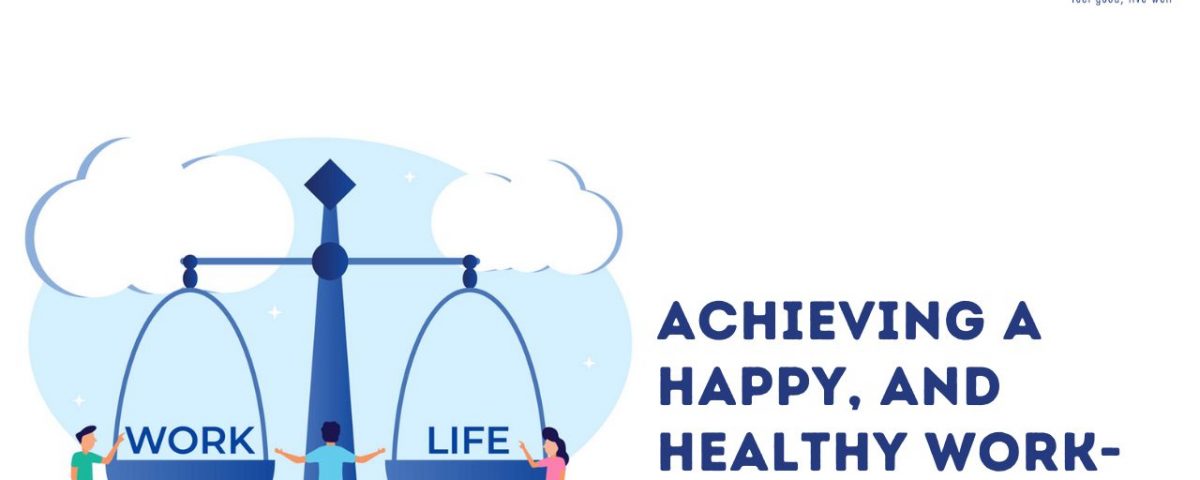Achieving a happy and healthy work-life balance
Feel like work is all you do?
Achieving work-life balance can be tough. Balancing your personal and professional life can be difficult and challenging, but it is essential. Essential for your physical and mental wellbeing. Achieving a happy, and healthy work-life balance is a key part of our self-care. A proper balance means we can juggle the responsibilities of work pressures, home life, social relationships, and leisure activities. Technology makes us feel accessible around the clock and work demands/ ethic can mean we work longer hours to keep on track or get ahead. However, investing more in your work life can mean losing time elsewhere, such as with family or friends and can risk burnout. This blog will expand on the benefits of prioritising a better work-life balance.
What is a work-life balance, and why is it important?
Work-life balance is defined as: the division of one’s time and focus between working and family, or leisure activities. Work-life balance can be thought of as the trade-off between time spent at work, or on work, and time spent with non-work-related activities. The idea of work-life balance is that after work, we can enjoy things that fulfil our mind and body, regenerating before the next workday. This could be participating in a hobby, hanging out with friends, or connecting with family.
Work-life balance is essential for health, mental and physical! We need to stay healthy and energised so we can be productive and achieve things. We cannot be productive all the time and an increase of hours without break means we can impact our health drastically. Without self-care and rest, burnout (link to other blog), fatigue and stress-related health issues are all a possibility. A poor work-life balance can increase symptoms of anxiety and depression. It can also result in a decline of physical health and increase the risk of strokes.
The stress of a never-ending workday is proven to be damaging for our relationships, health, and happiness.
How do I know I have a poor work-life balance?
We know a poor work-life balance affects all areas of our lives. So how do we know that we have a poor balance? Developed by Cooks-Campbell (2021), the telling signs can be:
- You struggle to take time off when you’re sick, have personal tasks or mentally strained. Your last vacation was forever ago, and don’t have plans for a future one
- You feel off – aches and pains. Very low energy at work, and find it difficult to concentrate
- Your relationships – inside and outside work – are suffering. You become easily irritated and distant
- Can’t stop thinking about work when you’re not at work
- Always feel you should be doing something else
- Can’t imagine doing what you do for the rest of your life
- Spend a lot of money on personal tasks.
Tips for creating a better work-life balance
Work-life balance means something different to every employee and individual. We have complied a list of tips that can guide you to a work-life balance that suits you:
- Accept a perfect work-life balance does not exist
- Work in a job that you love
- Exercise and meditate for your physical and mental wellbeing
- Unplug (technology free times)
- Vacation please!
- Make time for your loved ones, and more importantly – YOU!
- Set work boundaries, especially hours worked
- Set goals and priorities for your day
HOW CAN CBT HELP?
Consistently working overtime can cause fatigue, poor health, and negatively impact or mental health or take a toll on relationships. This can all have negative effects for our mental health, inside and outside of work. Luckily, our Brisbane and Gold Coast offices are home to some highly skilled, knowledgeable, and professional psychologists, that can help with creating a positive work-life balance or guide you through possible burn out and improve your overall mental wellbeing.
Please download our referral form here and take it with you to your GP appointment for preparation of a referral.
Contact us now via telephone or submit our online referral form here. That first appointment can be the next step to improving your work-life balance!
Helensvale: (07) 5551 0251
Mount Gravatt: (07) 3102 1366
Nerang: (07) 5668 3490
If you, or someone you know, required urgent help, please reach out to organisations like Beyond Blue. Or call the mental health helpline on 1300 22 4636. If this is an emergency, please contact 000 or visit your local emergency department.
Disclaimer: Firstly, content on this website is provided for education and information purposes only and is not intended to replace advise from your doctor or registered health professional. Lastly, readers are urged to consult their registered practitioner for diagnosis and treatment for their medical concerns.
REFERENCES
Jian L, (2014). 6 tips for better work-life balance. Forbes.
Sanfilippo, M. (2022). How to Improve your Work-life balance today. Business News Daily Contributing Writer.
VectorStock. (2023). Graphic cartoon character work-life balance vector image. VectorStock. https://www.vectorstock.com/royalty-free-vector/graphic-cartoon-character-work-life-balance-vector-36725876 – USED FOR THUMBNAIL
THREE CONVENIENT LOCATIONS
MOUNT GRAVATT
Mt Gravatt Medical PrecinctSE 105, 1808 Logan Rd
Upper Mount Gravatt QLD 4122


